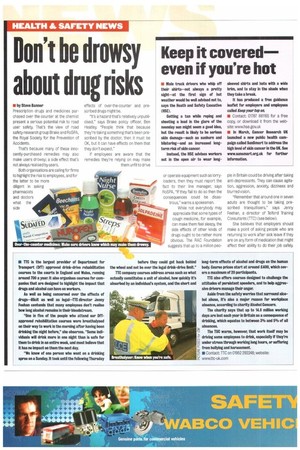Don't be drowsy about drug risks
Page 22

If you've noticed an error in this article please click here to report it so we can fix it.
• by Steve Banner Prescription drugs and medicines purchased over the counter at the chemist present a serious potential risk to road user safety. That's the view of road safety research group Brake and RoSPA, the Royal Society for the Prevention of Accidents.
That's because many of these innocently-purchased remedies may also make users drowsy; a side effect that's not always realised by users.
Both organisations are calling for firms to highlight the risk to employees, and for the latter to be more diligent in asking pharmacists and doctors what the side effects of over-the-counter and prescribed drugs might be.
"Ifs a hazard that's relatively unpublicised," says Brake policy officer, Ben Heatley. "People think that because they're taking something that's been prescribed by the doctor, then it must be OK, but it can have effects on them that they don't expect."
If employees are aware that the remedies they're relying on may make them unfit to drive or operate equipment such as lorryloaders, then they must report the fact to their line manager, says RoSPA. "If they fail to do so then the consequences could be disastrous," warns a spokesman.
While not everybody may appreciate that some types of cough medicine, for example, can make them feel sleepy, the side effects of other kinds of
drugs ought to be rather more obvious, The RAC Foundation suggests that up to a million pee
pie in Britain could be driving after taking anti-depressants. They can cause agltation, aggression, anxiety, dizziness and blurred vision.
"Remember that around one in seven adults are thought to be taking prescribed tranquillisers," says Jenny Feehan, a director of Telford Training Consultants (TIC) (see below).
She believes that employers should make a point of asking people who are returning to work after sick leave If they are on any form of medication that might affect their ability to do their job safely.




























































































































































